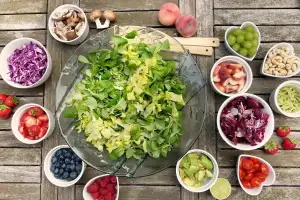Unraveling the Nutritional Secrets: Are Pretzels Really Healthy?

- Understanding the Ingredients in Pretzels
- Calories in Pretzels: Are They a Healthy Snack Option?
- Evaluating the Fat Content in Pretzels
- Sodium Levels in Pretzels: Potential Health Concerns
- The Role of Fiber in Pretzels: Benefits and Considerations
- Protein Content in Pretzels: A Comparison to Other Snacks
- Vitamins and Minerals in Pretzels: What Do They Contribute?
- Are Pretzels Suitable for Individuals with Specific Dietary Needs?
Pretzels have long been a popular snack choice, loved for their crunchy texture and savory flavor. But are they really a healthy option? In this article, we will delve into the nutritional secrets of pretzels to help you make informed choices about your snacking habits. From understanding the ingredients to evaluating the fat content, sodium levels, fiber, protein, vitamins, and minerals, we will unravel the truth behind pretzels' nutritional value. So let's dive in and discover whether pretzels deserve a place in your healthy eating plan.
Understanding the Ingredients in Pretzels
To truly unravel the nutritional secrets of pretzels, it is essential to delve into their ingredients. Traditional pretzels typically consist of flour, water, yeast, and salt. However, modern variations may also include additional ingredients such as sugar, oil, and flavorings.
The main component of pretzels is flour, which provides carbohydrates for energy. The type of flour used can vary, with some pretzels made from refined white flour and others incorporating whole wheat flour for added fiber and nutrients.
Water is crucial for the dough's hydration and helps create the desired texture. Yeast acts as a leavening agent, causing the dough to rise and giving pretzels their characteristic lightness.
Salt plays a significant role in enhancing the flavor of pretzels. It also aids in dough development by strengthening gluten formation and extending shelf life.
Additional ingredients like sugar or honey may be used to add sweetness or enhance browning during baking. Oil or fat can contribute to texture and flavor but can also increase calorie content.
By understanding these basic ingredients in pretzels, we can begin to assess their overall nutritional value and make informed choices about including them in our diet.
Calories in Pretzels: Are They a Healthy Snack Option?
When it comes to choosing a healthy snack, one of the key factors to consider is the calorie content. Pretzels are often perceived as a low-calorie option, making them an attractive choice for those watching their weight. On average, a serving of pretzels contains around 110-150 calories. This makes them a relatively low-calorie snack compared to other options like chips or cookies.
However, it's important to keep in mind that calories alone do not determine the overall healthiness of a food. While pretzels may be lower in calories, they can still contribute to weight gain if consumed in excess. Additionally, the type and quality of ingredients used in pretzels can vary greatly, impacting their nutritional value.
To make a more informed choice about the healthiness of pretzels, it's essential to consider other factors such as fat content, sodium levels, fiber content, and the presence of vitamins and minerals. By evaluating these aspects alongside calorie content, you can make better decisions about incorporating pretzels into your diet as a healthy snack option.
Evaluating the Fat Content in Pretzels
When it comes to evaluating the fat content in pretzels, it's important to consider both the type and amount of fat present. While pretzels are generally low in fat compared to other snacks like chips or cookies, they do contain some fat. Most of the fat in pretzels comes from added oils used in the baking process.
Typically, pretzels are made with vegetable oils such as soybean or canola oil. These oils contribute a small amount of unsaturated fats, which are considered healthier than saturated fats found in many other snack foods. However, it's worth noting that pretzels are not a significant source of healthy fats like omega-3 fatty acids.
To keep the fat content low, opt for plain pretzels rather than flavored varieties that may have additional fat from seasonings or coatings. It's also important to pay attention to portion sizes since consuming large quantities can increase your overall intake of fat.
While pretzels may not be completely devoid of fat, they can still be enjoyed as part of a balanced diet when consumed in moderation. As with any food, it's best to incorporate a variety of nutrient-rich options into your diet and maintain an overall healthy eating pattern.
Sodium Levels in Pretzels: Potential Health Concerns
Sodium levels in pretzels are a potential health concern that should not be overlooked. While they may be a tasty snack, pretzels tend to have high sodium content. This is mainly due to the use of salt during the baking process. Excessive sodium intake can lead to high blood pressure and an increased risk of heart disease. It is important for individuals with hypertension or other cardiovascular conditions to monitor their sodium intake and consume pretzels in moderation. Additionally, those who are watching their sodium intake for other health reasons should be cautious when indulging in this popular snack.
The Role of Fiber in Pretzels: Benefits and Considerations
Fiber is an essential nutrient that plays a crucial role in maintaining a healthy digestive system. It aids in regulating bowel movements, preventing constipation, and promoting overall gut health. When it comes to pretzels, the fiber content varies depending on the type of flour used.
Traditional pretzels made from white flour tend to have lower fiber content compared to those made with whole wheat or multigrain flours. Whole grain pretzels are a better choice as they contain more fiber, providing a feeling of fullness and helping to control appetite.
However, it's important to note that even whole grain pretzels may not be as high in fiber as other snacks like fruits or vegetables. While they can contribute to your daily fiber intake, it's still recommended to consume a variety of high-fiber foods for optimal health benefits.
Additionally, individuals with certain digestive conditions such as irritable bowel syndrome (IBS) or gluten intolerance should exercise caution when consuming pretzels. The gluten content in regular pretzels may trigger symptoms in those with gluten sensitivity or celiac disease.
In conclusion, while pretzels can provide some amount of dietary fiber, they should be consumed in moderation and as part of a well-balanced diet that includes other high-fiber foods.
Protein Content in Pretzels: A Comparison to Other Snacks
When it comes to snacking, protein is an important factor to consider. Pretzels may not be the first snack that comes to mind when you think of protein, but they do contain a moderate amount. A one-ounce serving of pretzels typically provides around 3 grams of protein.
While this may not seem like much compared to other snacks like nuts or Greek yogurt, it is still a decent amount for a crunchy and savory treat. In comparison, a serving of potato chips usually only contains about 2 grams of protein.
If you're looking for a higher protein snack, there are certainly better options available. However, if you enjoy the taste and texture of pretzels, they can still contribute to your daily protein intake in a small way. Just be sure to balance it with other sources of protein throughout the day for optimal nutrition.
Vitamins and Minerals in Pretzels: What Do They Contribute?
Vitamins and minerals play a crucial role in maintaining overall health and well-being. When it comes to pretzels, they do contribute some essential nutrients. Pretzels are a good source of iron, which is important for oxygen transport in the body. They also contain small amounts of B vitamins, including niacin and thiamine, which help convert food into energy. Additionally, pretzels provide trace amounts of magnesium and zinc, which support various bodily functions. While pretzels may not be as nutrient-dense as other snacks, they can still contribute to your daily vitamin and mineral intake when enjoyed in moderation.
Are Pretzels Suitable for Individuals with Specific Dietary Needs?
Individuals with specific dietary needs may wonder if pretzels are a suitable snack option for them. Fortunately, pretzels can be a good choice for many people with dietary restrictions. For those following a gluten-free diet, there are now gluten-free pretzel options available on the market. Additionally, individuals who are vegan or vegetarian can enjoy pretzels as they typically do not contain any animal products. However, it is important to note that some flavored or coated pretzels may contain dairy or other animal-derived ingredients, so it is always advisable to check the label carefully. Overall, pretzels can be a versatile and satisfying snack for individuals with specific dietary needs, but it is crucial to read labels and choose options that align with their specific requirements.
In conclusion, when it comes to pretzels and health, it's important to make informed choices. While pretzels can be a satisfying snack option due to their low fat content and potential fiber benefits, it's crucial to be mindful of portion sizes and the sodium levels in certain varieties. For individuals with specific dietary needs, such as those on a low-sodium or gluten-free diet, pretzels may not be the best choice. Ultimately, balance is key - incorporating a variety of nutritious foods into your diet will ensure you're getting all the necessary vitamins and minerals for optimal health.
Published: 13. 12. 2023
Category: Health



